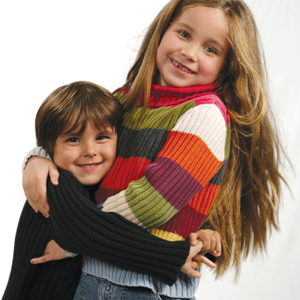We used to fight in fierce, lengthy battles with the tether ball between us. My big sister would pound the ball in my direction, “Hey, Bumps!” she’d shout, referring to the dry, itchy skin I had on the back of my arms. I’d whack the ball back at her, “Just fine, Pepper!” referring to the tiny blackheads that were sprinkled beneath her nose.
While these nitpickings happened a long time ago, my sister and I remember them today and lots of other conflicts. We were often cruel to one another. We would tell on each other, compete for our parents’ attention and bother each other on purpose. But today I would be lost without my sister’s presence, or any of my brothers and sisters whom I all love equally.
We all live hundreds of miles apart, but when we get together, we are immediately and completely comfortable as ourselves, together, fully realized. Growing up, our parents made efforts to build love, friendship and respect among us.
Well past the teasing and taunting that took place in our developmental years, we were left with lasting, caring relationships unlike any other – the kind of relationship we yearn for in life. It starts early on when a firstborn child is about to become a sibling.
When a New Sibling is Coming
When you bring a second child into your family the balance the first child has enjoyed suddenly falls off kilter. So when you learn that a second baby is on the way, begin building the idea of welcoming the new family member into the family with your firstborn. Even if your firstborn is so young he only understands half of what you say, you can talk about the new baby coming and about the importance of brothers and sisters, says Penelope Leach, M.D., in her book, Your Baby and Child From Birth to Age Five (Knopf; $23.95). Be sure to involve your older child in decisions surrounding the new baby’s living space, the sharing of toys and shared fun.
Encourage your older child by recognizing little things he wants to do to welcome the baby. By bringing the new baby into the older child’s fold before his arrival, parents prepare the heart and mind of the older child. Once the baby has arrived, first children quickly assume that a new baby in the family means less parental love for them and feelings of jealousy may surface for the first time. The first child may try to find out if you love him “the most,” says Leach, so be sure to find ways to reassure your firstborn. Things like “I’m the Big Brother” on a T-shirt or a small gift when the baby comes home is a nice touch, but daily check-ins with the firstborn are in order.
Praise and encouragement are required. And by the time your second child is old enough to sit up in his crib, it’s time to begin offering your little one the company of your older one by themselves in the morning when the baby wakes. “There are no grown-ups around to create jealousy,” says Leach. Early morning play sessions like this – even just 10 minutes a day – where the baby is in his crib and the older sibling is on the other side interacting, can create the basis for a close affectionate relationship filled with private sweetness.
Look for ways to include all of your children in conversations together, in decisions and in family activities. This helps to bond your family unit, Leach says. And at the same time, concentrate on cultivating separate, distinct bonds with each child. Your children want the assurance that you have reserved a special place in your heart for each of them and that no other boy or girl can ever replace them. Other tips for building a loving, irreplaceable bond with the siblings as they grow older include:
Avoid Comparisons
While parents automatically search for similarities and contrasts between their children, be careful. Comparisons can stir up feelings of inadequacy in kids and pit them against each other, says Leach. Comparing children conveys the message that your love and acceptance are conditional, especially when questions like, “Why can’t you be like your sister?” slip out.
Allow Self-Expression
Try not to trivialize your children’s emotions when they surface. When one of your kids says something about his siblings, no matter how shocking it is to you, it’s better to paraphrase his feelings than to react to them: “It makes you furious when she borrows your things without asking;” “You wish babies didn’t take so much time;” “Sometimes you resent having your little brother tag along.” Hearing you put his feelings into words – even if it’s his fantasy about going back to being an only child again – helps convince him that what he thinks and feels really matters to you.
When Sibs Squabble
Life is filled with ups and downs and battles of wills. Depending on your children’s personalities, there will be bickering and perhaps even out and out slug fests between them. The kids will benefit most if they can learn to solve differences on their own and without your intervention, says Marian Edelman Borden, author of The Baffled Parent’s Guide to Sibling Rivalry (McGraw Hill). Since home is a comfort zone, kids can naturally fall apart in ways they never would at a friend’s house or in school.
To keep the peace, each child needs to hear your house rules repeated often so they learn them through and through. Say to your children, “I know sometimes we get upset, but we never hit; you have to use words to let us know how you feel.”
Let all your kids know that if they can’t get along you’re going to separate them. “That might be the biggest motivator of all,” says Borden. “In the end, they’ll probably behave because they want to keep playing together.”
Susan Day is editor in chief of this publication. She’s the mom of four great kids.
the sibling advantage
Research has shown that having a sibling provides definite emotional and developmental benefits.
- On a simple level, a sibling provides ready, available companionship. As many hours as parents are willing to devote to entertaining their child, kids enjoy the company of their peers
- Fantasy play, so important in a child’s development, is more fun with another youngster at about the same developmental age
- More importantly, having a sibling means being a part of another child’s world. An only child tends to live in an adult world because the child interacts so much with grown-ups
- Living with a sibling teaches critical negotiation skills. Brothers and sisters learn about compromise – and they learn how to make up.
- As kids learn to share, they’ll hone skills such as taking turns, respecting others and negotiating, says Nancy Samalin, author of Loving Each One Best: A Caring and Practical Approach to Raising Siblings. But keep in mind that everyone needs a room of one’s own (at least metaphorically). Sometimes siblings simply need time apart from each other.
Source: The Baffled Parents Guide to Sibling Rivalry





